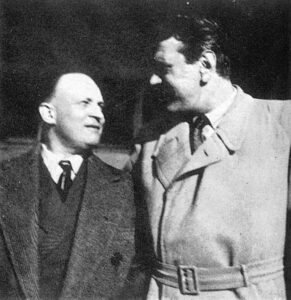The Hero's Journey
YOUR CAREER IN LAW
This
Continuing Legal Education (CLE)
program includes
- An overview of the Hero's Journey (monomyth)
- A hero's tale from World War II
- A practical exercise for optimizing careers in law
defines stages of the Hero’s Journey (Joseph Campbell’s “Monomyth”) and recounts the saga of WWII’s most daring operatives: Forest Yeo-Thomas, the original James Bond; and Otto Skorzeny, Hitler’s top commando.
puts attendees at the center of discussion, with an exercise that breaks through the Matrix of everyday routines and sets a course for the future.
Appreciations
- "This is one of the best CLEs I've ever had."
- “I didn't look at my phone once.”
- “The exercise motivated me and made me think about what I am capable of doing.”
- "Good to hear from a non-attorney on issues like this."
- “Amazing perspectives on how to shape life skills."
- “Mr. Greene is amazing. I would take another one of his classes or seminars.”
We enter into a career in law with certain expectations.
Having spent time and money getting here, we anticipate rewards, satisfactions, and opportunities to advance. What happens when those expectations are frustrated? How do we cope with the disparities between our imagined career and its harsher reality? “The Hero’s Journey” explores the thin border that separates reality from illusion in a legal career.

Two “heroes,” Nazi commando Otto Skorzeny and British underground agent Forest Yeo-Thomas, were familiar with that thin line. As top-tier military operatives, they were forced to ask themselves: “What is my price? Is winning more important than the integrity of my character? Will I do anything to win?” They chose the path of integrity—a choice that united two men who could not have been less alike in every other way. Their saga provides a vivid reference for our examination of a career in law.
During the war years, Yeo-Thomas and Otto Skorzeny knew one another only by name. It was not until 1947 that they met face to face: a courtroom on the grounds of former concentration camp Dachau, where Skorzeny stood trial for his life before a tribunal of the U.S. Third Army. Yeo-Thomas had been tortured nearly to death by the Nazis, yet he appeared in court to speak on behalf of his former enemy. Theirs became one of history’s most unexpected friendships and one that raised troubling questions about the rightness and wrongness of behavior under adverse conditions.
Theirs became one of history’s most unexpected friendships and one that raised troubling questions about the rightness and wrongness of behavior under adverse conditions.
Perhaps the most challenging questions to emerge from their friendship were not so much legal as ethical. How could a man fighting for a genocidal regime be deemed honorable? How could his enemy, a man sworn to bringing him down, commit himself as wholeheartedly to saving his life?
It may not be possible to reconcile Otto Skorzeny’s military allegiances with his extraordinary character—just as impossible as fathoming how a man who survived repeated torture by Nazi captors could then honor a Nazi commando before the eyes of the world. Yet here were two heroes from enemy armies convinced that in the rubble of a terrible time a treasure lay buried, a wealth of character awaiting resurrection.
The moral and ethical questions raised by this extraordinary story from World War II form the narrative point-of-reference for “The Hero’s Journey: Your Career in Law.”


In the first half of this two-hour program, we define the stages of the Hero Journey (or “Monomyth”) as outlined in Joseph Campbell’s 1949 book, The Hero with a Thousand Faces. These stages include, in Campbell’s terms, the Call to Adventure, the Road of Trials, the Point of No Return, Achieving the Boon, and the Return to the Ordinary World. We then recount the story of Skorzeny and Yeo-Thomas. In the second half, we begin by examining the anomalies in the Skorzeny-Yeo-Thomas saga and draw parallels with challenges in a legal career, such as dealing with fear and the temptation to attain success; confronting inner conflict and loss of self-confidence; and daring to ask the existential question: Did I choose the right vocation?
Attendees then take part in an established time-management exercise, which gives them an opportunity to identify—without reservation, judgement, or condition—any and all goals they wish to achieve in their lifetime. The freedom to express inner desires, however radical, can be liberating.
The program concludes with open discussion. In previous presentations, topics have ranged from issues of the Dachau war crimes trials, where Otto Skorzeny and his men were tried for violations of the Hague Convention (specifically fighting in the enemy’s uniform), to practical career strategies.
